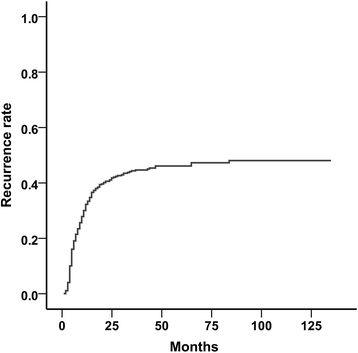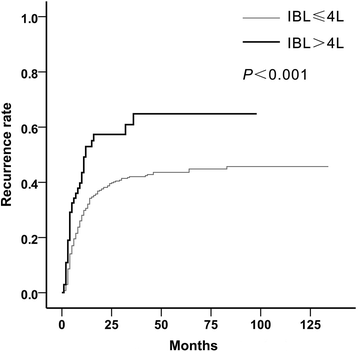Excessive intraoperative blood loss independently predicts recurrence of hepatocellular carcinoma after liver transplantation
- PMID: 26472203
- PMCID: PMC4608055
- DOI: 10.1186/s12876-015-0364-5
Excessive intraoperative blood loss independently predicts recurrence of hepatocellular carcinoma after liver transplantation
Abstract
Background: Several studies have investigated the effect of intraoperative blood loss (IBL) on recurrence of tumors. However, the independent effect of IBL on oncological outcome after liver transplantation (LT) for hepatocellular carcinoma (HCC) is unclear.
Methods: A total of 479 patients who underwent LT for HCC from January 2001 to December 2012 at our institution were enrolled in this retrospective study. Kaplan-Meier and Cox regression methods were used to assess the recurrence rate, as well as its risk factors. Stratified analysis was performed to further examine the effect of IBL on HCC recurrence according to different characteristics of tumors. We also investigated the independent risk factors for excessive IBL using logistic regression analysis.
Results: The median follow-up was 28 months (range, 1-131 months). Kaplan-Meier analysis with the log-rank test according to IBL at per liter intervals showed that IBL > 4 L was significantly associated with a higher recurrence rate (P < 0.001). Multivariate analysis identified that IBL > 4 L (P < 0.001; hazard ratio [HR] = 2.32, 95 % confidence interval [CI] = 1.60-3.36) was an independent risk factor for post-LT HCC recurrence, as well as age < 60 years, exceeding Milan criteria, α-fetoprotein levels > 400 ng/mL, and micro- and macrovascular invasion. IBL > 4 L (P < 0.001; HR = 2.45, 95 % CI = 1.64-3.66) was also independently associated with early (within 1 year) recurrence after LT. Furthermore, a significant correlation between IBL > 4 L and vascular invasion (P = 0.019) was found. IBL > 4 L was independently associated with HCC recurrence for patients with vascular invasion, but not for patients without vascular invasion. Finally, we found that the presence of ascites, model for end-stage liver disease score, and operation time were independent risk factors for IBL > 4 L.
Conclusions: Excessive IBL is an independent predictor of HCC recurrence after LT, especially in patients with vascular invasion.
Figures



Similar articles
-
Rate of tumor growth predicts recurrence of hepatocellular carcinoma after liver transplantation in patients beyond Milan or UCSF criteria.Transplant Proc. 2011 Dec;43(10):3813-8. doi: 10.1016/j.transproceed.2011.09.043. Transplant Proc. 2011. PMID: 22172852
-
A novel prognostic nomogram accurately predicts hepatocellular carcinoma recurrence after liver transplantation: analysis of 865 consecutive liver transplant recipients.J Am Coll Surg. 2015 Apr;220(4):416-27. doi: 10.1016/j.jamcollsurg.2014.12.025. Epub 2014 Dec 27. J Am Coll Surg. 2015. PMID: 25690672
-
Time of hepatocellular carcinoma recurrence after liver resection and alpha-fetoprotein are important prognostic factors for salvage liver transplantation.Liver Transpl. 2014 Sep;20(9):1057-63. doi: 10.1002/lt.23919. Liver Transpl. 2014. PMID: 24862741
-
Impact of non-oncological factors on tumor recurrence after liver transplantation in hepatocellular carcinoma patients.World J Gastroenterol. 2016 Mar 7;22(9):2749-59. doi: 10.3748/wjg.v22.i9.2749. World J Gastroenterol. 2016. PMID: 26973413 Free PMC article. Review.
-
Intraoperative autologous transfusion and oncologic outcomes in liver transplantation for hepatocellular carcinoma: a propensity matched analysis.HPB (Oxford). 2022 Mar;24(3):379-385. doi: 10.1016/j.hpb.2021.06.433. Epub 2021 Jul 6. HPB (Oxford). 2022. PMID: 34294524 Review.
Cited by
-
Is left-sided involvement of hepatocellular carcinoma an important preoperative predictive factor of poor outcome?World J Surg Oncol. 2020 Dec 3;18(1):317. doi: 10.1186/s12957-020-02100-6. World J Surg Oncol. 2020. PMID: 33272298 Free PMC article.
-
Conditional disease-free survival after liver transplantation for hepatocellular carcinoma: A two-center experience.Medicine (Baltimore). 2016 Aug;95(31):e4383. doi: 10.1097/MD.0000000000004383. Medicine (Baltimore). 2016. PMID: 27495049 Free PMC article.
-
Importance of Intraoperative Transfusions of Packed Red Blood Cells and Fresh Frozen Plasma in Liver Transplantation for Hepatocellular Cancer.Ann Transplant. 2020 Oct 9;25:e923665. doi: 10.12659/AOT.923665. Ann Transplant. 2020. PMID: 33079923 Free PMC article.
-
Oncologic Outcomes of Intraoperative Autologous Blood Transfusion for Major Oncologic Resection.Ann Surg Oncol. 2025 Aug 17. doi: 10.1245/s10434-025-18024-y. Online ahead of print. Ann Surg Oncol. 2025. PMID: 40819338
-
A practical recurrence risk model based on Lasso-Cox regression for gastric cancer.J Cancer Res Clin Oncol. 2023 Nov;149(17):15845-15854. doi: 10.1007/s00432-023-05346-1. Epub 2023 Sep 6. J Cancer Res Clin Oncol. 2023. PMID: 37672074 Free PMC article.
References
Publication types
MeSH terms
Substances
LinkOut - more resources
Full Text Sources
Other Literature Sources
Medical

